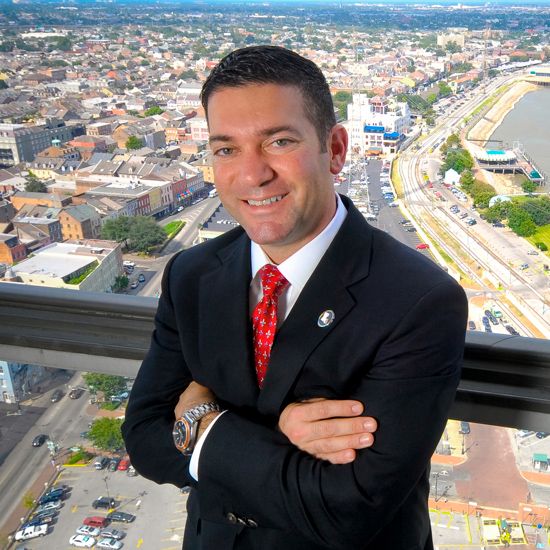What is Transformative Economic Development?
A new monthly post about economic development from Greater New Orleans, Inc. President & CEO Michael Hecht. Inspired by questions about what economic development is, why it matters, and how it can have systemic positive impact, “Transformative Economic Development” is a handbook of best practices that can be used by anyone that wants to help create a thriving economy, and an excellent quality of life, for everyone in their community.
October 5, 2021 – I didn’t know what economic development was growing up. But in retrospect, there were signs. I used to build cities on my floor out of Legos and Lincoln Logs (very easy with no zoning). I was involved in student government. In college, I majored in sociology - the study of people, followed by business school - the study of money. Without knowing it, I was training to be an economic developer.
But when I took the job at GNO, Inc., the economic development agency for Greater New Orleans region, I was still a bit hazy on the concept. I certainly understood the selling aspect of economic development, and the importance of growing jobs. But, like most people, I thought economic development was mostly about sales. That was fine. I loved New Orleans, liked to talk, and enjoyed a ribbon-cutting as much as the next guy.
This incomplete understanding of economic development was fixed forever on a benchmarking trip to Charlotte, one of the fastest-growing cities in the nation. We were eating lunch on the top floor of a bank headquarters: the food bland, the views grand. My host was chairman of the local economic development group. He was proud of his region, widely seen as a good location to both base a company and raise a family, creating a virtuous cycle of jobs and workforce.
The chairman was a pretty famous and powerful guy; for example, he had been asked to voice a character in an animated film that was based on him. He was wearing cowboy boots, and a large Stetson. I asked, “What’s it like doing economic development in your city?”
He looked at me, chewed his steak, and swallowed. “Well, Michael, doing economic development here is like running a laundromat: we just open our doors, and people bring us their money!”
That’s when it hit me. Economic development is not about marketing taglines and websites. It’s not about fancy dinners and golf tournaments. It’s not even about who has the richest incentives. Fundamentally, economic development is about creating the conditions wherein businesses want to invest their capital and people want to live. It’s that simple. If you have a fair and stable business environment and offer a good quality of life, you are going to enjoy the benefits of economic development. Your laundromat will be open.
The implication for economic development strategy is profound: we should spend fewer resources on sales, and more on substance, on creating the conditions for job and population growth. By analogy, it means that rather than trying to sell more cars with flashy promos and cannibalizing discounts, we should design a better car.
This, then, is the essence of economic development: creating the conditions where businesses want to invest and where people want to live.
(Note that, in the post-COVID era, “creating the conditions where people want to live” is more important than ever. Urban planner Richard Florida writes, “Cities used to compete for jobs and tax revenue by attracting companies. In the era of remote work, they will compete to attract knowledge workers. Individuals can relocate much more easily than companies. This will swiftly reward competent cities and punish incompetent ones.”)
Basing off of this foundation, economic development must be both holistic and inclusive. It must be holistic in the sense that many, many factors go into making a place attractive to businesses and workers – from tax structure, to infrastructure, to public safety, to parks and amenities. It must be inclusive because for an economy to prosper, it must maximize the potential of all of its citizens and thus provide the workforce for companies to grow. This means it is not enough to just bring in new companies and jobs. We must also ensure that residents have awareness of, training for, and access to these jobs.
GNO, Inc. is organized around this evolved idea of economic development. We have a “Business Development” division that works to attract and retain companies. But we have a larger “Business Environment” division that focusses on “creating the conditions where businesses want to invest, and where people want to live.” Our Business Environment team handles elements including public policy, workforce training, asset development (like the airport), and even the “brand” of New Orleans. If our Business Environment group does its job, the soil is well fertilized and ready for Business Development to grow, naturally.
But we know at GNO, Inc. that when working this approach, not all economic development is the same. In fact, some “economic development” is not really economic development at all.
Economic development is fundamentally about taking money from outside your jurisdiction, and bringing it in. To use a common expression, it is about “growing the pie.” This can be accomplished in a few ways. One is to sell an “export good” that outsiders pay for. When a local company sells a widget to a customer in another state, or country, that is economic development. It can also be accomplished by having people simply bring you their money. The common term for this is “tourism,” a phenomenon worth nearly $10B in annual spending for the Greater New Orleans area.
You can also think about economic development as the goal of growing net new jobs, which grows overall income. There are a few ways to do this. One is to bring in a new company, via an expansion, or even a headquarters relocation - the Holy Grail of economic development. You can also work with an existing company to help it grow jobs within the market. This is not as flashy as an expansion win, and is less likely to garner a headline in the paper, but is typically much easier, as the company is already here (and the fact is, most new job growth comes from existing companies). Finally, supporting entrepreneurship is an important and catalytic way to grow jobs – and new revenue – especially with a focus on high-growth startups. Emphatic proof of the economic development power of entrepreneurship was recently made by the exit of local construction tech startup Levelset: the $500M sale of the firm will inject over $180M back into the local economy.
But as I said, not all economic development is economic development. If a business is just selling to consumers who are “in-market,” it may be providing an important community service, but it is not really economic development. The same goes if a business closes one location, and opens a new one, but creates no net new jobs, overall. For example, if a grocery store opens in a neighborhood that needs fresh food, this is important community development. But because the people who shop at the new store previously bought from another store nearby (perhaps a local corner shop), this is not really economic development. We have just “moved the eggs around the plate.”
Similarly, not all economic development is good economic development. Good economic development is strategic, catalytic, and high-quality. Strategic, in that the new business/jobs make sense for the economy and location. Catalytic, in that the business will grow, and will create not only direct jobs, but also “indirect” (e.g. supplier) and “induced” jobs (e.g. more restaurant workers to serve the new employees) – this is called the “multiplier effect.” Finally, any jobs created should be high-quality: well-paying, with opportunity for advancement.
What would be “bad” economic development? A company that is only there for the incentives; jobs that don’t help residents create wealth; policies that score political points but scare away companies.
At GNO, Inc., we try to focus on strategic, catalytic, and high-quality economic development by targeting six specific sectors. Three are in “foundational” sectors: energy, trade, and advanced manufacturing; three are in “diversifying” sectors: technology & digital media, bio-medical, and environmental management. These sectors were chosen because all offer good jobs, leverage local competitive advantages, and are in ascendance nationally. Diversification is critical because a diverse economy is more resilient to economic, political, and natural shocks; the past few years have shown that for New Orleans, and the country, economic diversification is more important than ever.
So now that we have defined good economic development, how do we measure success? There are two basic quantitative measures: job creation and investment.
The most direct unit of job creation is a “direct job.” Direct jobs are positions that will be directly paid by the employer. A skeptic will note that the jobs announced at an economic development ribbon-cutting are often “to-be-hired,” and so we are taking credit for jobs that don’t yet exist. Fair enough, and the real work in economic development happens after the announcement – to ensure the company can fulfill and exceed job projections.
Job creation can also include indirect and induced jobs, as a result of the multiplier effect. Because multipliers can get as high as 10x for some projects, like manufacturing, and because the concept is a bit abstract, at GNO, Inc. we tend to be conservative, and talk mostly about direct jobs.
Finally, job creation can be expanded to include job retention, if work was done to legitimately prevent a business from moving or some other loss of jobs. For example, we recently averted a headquarters from moving to Houston. Instead, they stayed here, and will, in fact, add more jobs. Not only the new jobs, but also the 50+ jobs that we “saved,” count as legitimate economic development wins.
Investment, on the other hand, is pretty straightforward. If a facility will take $2B to build, all-in (land, labor, materials, soft-costs, etc.), it is considered a $2B economic development project. Investment is important because it means construction jobs, and then future property tax revenue. Plus, new facilities spur additional investment, like roads and retail shops.
Over the long-haul, economic development can be measured by statistics including migration rates, GDP growth, and poverty reduction. People will move to follow job opportunity, and those places with growing populations and prosperity are inevitably powered by economic development success.
But there is also a more important, albeit less concrete, measure of success. To appropriate a famous line from the Supreme Court, you just know successful economic development when you see it. Good economic development has energy, momentum, and magnetism—companies and people want to be part of it. Think about it: When you consider which cities are crushing economic development today, are you thinking about the number of jobs created, or do you just get the feeling that these places are “on a roll”?
A word of caution: there are pitfalls with “taking credit” for jobs and investment. As said at the outset, a broad range of factors influence business location and expansion decisions, some of which are pre-existing conditions, like geography, and some of which are simply luck, like where a CEO grew up. And on any economic development win, there are typically many to whom the credit belongs. At GNO, Inc., we are always very careful to speak of wins in terms of partnership, and to share the credit. We are also careful to only claim victory for projects in which we had a “material” involvement, such as help finding a site, or recruiting workers, or navigating incentives.
To close, having defined economic development, and how it is measured, we should now ask: Why does economic development matter?
Simply put, because it lets you have nice things. Or more specifically, economic development builds your tax base to fund nice things, like roads, and drainage, and police and fire protection. Like parks, and sports teams, and art and music festivals. Economic development creates jobs and opportunities, brings people and companies, and increases your region’s tax base (without increasing taxes).
Moreover, without economic development, your region’s social efforts won’t work. Affordable housing, public transportation, good schools, quality hospitals…these and other essential public goods are expensive and require the support of a stable tax base.
Finally, economic development lets your kids stay, and raise your grandkids right here. Without economic development, you have stagnation and decline. And your kids move away.
Richard Campanella of Tulane explained it to me roughly like this, “Cities exist in dynamic equilibrium, like a bicycle: they are either moving forward, and are stable; or, they stop moving, wobble, and eventually fall over.” Economic development is the power that keeps our communities moving forward, and stable, for future generations.
Want to learn more about GNO, Inc. or economic development? Email Michael Hecht at mhecht@gnoinc.org.

